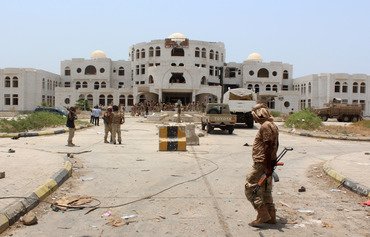A new cash-for-work programme in southern Yemen's Abyan province that aims to combat poverty will help young people find jobs and prevent them from joining terror groups, experts tell Al-Mashareq.
Local authorities launched the programme in Zinjibar and Khanfar districts on February 10th in a ceremony attended by the deputy governor and secretary general of Abyan's local council, Mahdi al-Hamed, along with other officials and representatives of organisations supporting the programme.
The programme is being implemented by Diversity Organisation (DO) with support from the International Organisation for Migration (IOM), and is funded by the King Salman Humanitarian Aid and Relief Center (KSrelief) and the UAE.
The cash-for-work programme aims to boost the resilience of vulnerable communities, internally displaced persons (IDPs), families that have no source of income, people with special needs, people with chronic diseases and families that have not received any assistance during the past six months.
It will provide recipients with a capital to start small businesses that contribute to improving their livelihoods, said DO regional director Bashir al-Naqib.
"The main activities to be implemented during the four-month programme include the removal of harmful trees, construction waste, dirt and trash, as well as sewage-related works and tree planting," Naqib said in a speech during the launching ceremony.
Awareness-raising campaigns at schools also will be carried out to encourage environmental sanitation, he said.
Creating job opportunities
"The cash-for-work programme will provide job opportunities for 350 people in the districts of Khanfar and Zinjibar," Khanfar local council secretary general Nasser al-Mansari told Al-Mashareq.
Seventy of them will be in Zinjibar and 280 in Jaar, the capital of Khanfar district, he said.
"The programme also helps cancer patients, kidney failure patients, people with special needs and blind people by covering their treatment expenses, provided that their children or relatives complete the work assigned to them," he said.
The implementation of such a programme in Khanfar provides youth with jobs and a source of income, he said, and protects them from getting involved with terror groups.
"Some youth join these groups to have a source of income for their families," he said, as extremist groups such as al-Qaeda in the Arabian Peninsula (AQAP) exploit the difficult circumstances among the youth to recruit them into their ranks.
'Effective tool in reducing extremism'
Cash-for-work programmes are among the most effective humanitarian tools to improve the lives of vulnerable and remote communities adversely affected by conflict, development expert Abdel-Ilah Taqi told Al-Mashareq.
These programmes "meet short-term humanitarian needs by providing cash", he said. They also meet long-term development needs through the provision of services and by helping the targeted population acquire new skills.
"In areas that were previously under al-Qaeda's control, such as Zinjibar and Jaar, cash-for-work is an effective tool in curbing extremism and recruitment into the ranks of extremist groups," he said.
In light of the chronic conflicts that Zinjibar and Jaar have endured for several years, "transitory aid is no longer helpful", Taqi said.
"The best solution is what is referred to in the humanitarian work field as economic and social 'early recovery' through the cash-for-work mechanism," he said.
Early recovery enables people to use the benefits of humanitarian action to seize development opportunities, build resilience, and establish a sustainable process of recovery from crisis.
Reviving local economies
"The mechanism of these programmes achieves four objectives, the first of which is to respond to emergency cases by providing wage-paying jobs to the members of working families to purchase basic items," said economic expert Abdul Jalil Hassan.
The second objective is to provide basic sustainable services to the community, such as paving streets and rural roads, building rainwater collection tanks, reclaiming farm land, and protecting soil and water [quality] to boost food production, he told Al-Mashareq.
"The third objective is to provide vulnerable and affected families with opportunities to receive training on construction work and production of goods so they can start their own businesses or small enterprises," he said.
While the final objective is to see the money paid for wages and the purchase of building materials for these projects contribute to reviving local trade, said Hassan.
This allows for the circulation of hard currency inside Yemen, he said, "instead of spending it on importing commodity aid items from abroad".

![Yemenis sell petrol on the street after Yemeni government forces re-entered Zinjibar, the capital of Abyan province, on August 16th, 2016 following an offensive backed by coalition airstrikes to recapture the city from al-Qaeda extremists. [Saleh al-Obeidi/AFP]](/cnmi_am/images/2019/03/01/16893-Yemen-Abyan-Zinjibar-600_384.jpg)






